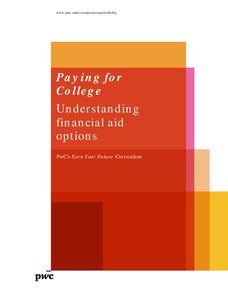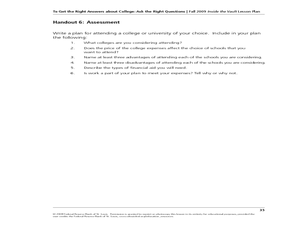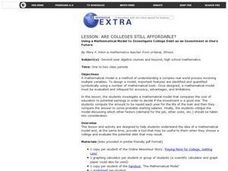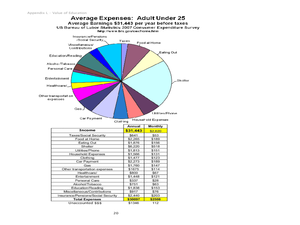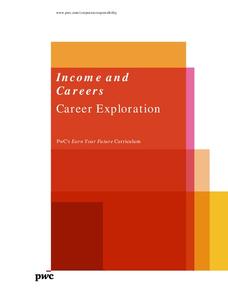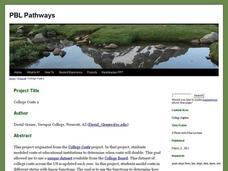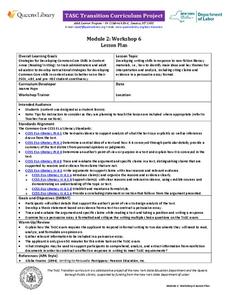PricewaterhouseCoopers
Paying for College: Understanding Financial Aid Options
With many options to pay for college, middle schoolers learn about each possibility and that continuing their education is worth the investment. They discover the difference between a grant and a loan and that some expensive colleges may...
PricewaterhouseCoopers
Paying for College: Finding the Right Fit
Most want to attend college, but do they know where? How will they afford it? How do they apply? Learners discover the costs associated with college and the best way to budget and possibly apply for financial aid.
Curated OER
The Value of Education
Money is always a great motivator. Give the class a set of statistics regarding yearly annual wages with the corresponding level of completed education. Even if they think college is silly, they'll consider it when they realize how much...
Visa
The Cost of College: Financing Your Education
With college tuition at an all-time high, high school learners must consider the financial obligations of attending higher education, as well as the impact of college on future career opportunities. Pupils will complete worksheets,...
California Department of Education
College: Plan Well and Pay Less
They say you gotta pay to play, and postsecondary education is no exception! High schoolers learn how to research and analyze the cost of postsecondary education as well as the different ways to pay for schooling. Learners then work...
Federal Reserve Bank
The Rising Cost of College: Tuition, Financial Aid, and Price Discrimination
Are average college tuition and fees really rising in the United States? Here is a fascinating take on the rising cost of college tuition and how price discrimination may explain what is often seen as an insurmountable cost for higher...
Curated OER
The Real Cost of College
How do people pay for college? Learners explore the concept of paying for college, they discuss possible ways to pay for college, research the cost of colleges, room and board, and other college living expenses.
Federal Reserve Bank
Invest in Yourself
What are the different ways that people can invest in their human capital for a better future? Pupils participate in an engaging hands-on activity and analyze data regarding unemployment, the ability to obtain an education, and median...
Practical Money Skills
Student Loans
If your learners are college bound, they'll need a lesson about student loans and personal finance before they step into their dorm room. A four-day lesson guides high schoolers through the process of budgeting for college, as well as...
Curated OER
To Get the Right Answers about College: Ask the Right Questions
High schoolers survey college students. In this lesson, high schoolers explore typical costs. They examine education loans. Students complete a FASFA form and write an essay describing plans for obtaining money for college expenses.
Curated OER
Are Colleges Still Affordable?
Students investigate mathematical model that compares cost of higher education to potential earnings in order to decide if the investment is a good one. They compute amount to be repaid each year for the life of a student loan and then...
Curated OER
The Value of Education
The real value of education is highlighted in more than one way on a worksheet designed to not only add, subtract, multiply, and divide decimals to hundredths, but also to address the correlation between higher pay with accomplishing...
US Department of Commerce
Where to Next?
Salary, education, census statistics ... how do people choose their careers? Scholars complete worksheets and rely on census data to determine their career aspirations. Then, pupils conduct Internet research about places they would...
US Department of Commerce
Educational Attainment and Marriage Age - Testing a Correlation Coefficient's Significance
Do women with college degrees get married later? Using a provided scatter plot of the percentage of women who earn bachelor's degrees and the median age at which women first get married over time, pupils conduct a linear regression...
Curated OER
Value of Education: Education and Earning Power
Students explore the earning power of someone with a post-high school education. For this education and income lesson, students evaluate examples of occupations, their salaries, and education level needed for the job. Students calculate...
Curated OER
Congress OKs Bill Aimed At Toppling College Obstacles
Learners explore the concept of financial costs of college. In this financial costs of college lesson, students read an article about college costs. Learners research the cost of college for the school of their choice. Students discuss...
Curated OER
College Simulation
Students pretend they are a college freshman and taking a full load of classes. Individually, they create a budget based on their $9.00 an hour job in order to meet all of their repsonsibilities. They complete the simulation online and...
PwC Financial Literacy
Income and Careers: Career Exploration
Elementary schoolers take part in a virtual career day and are exposed to various career opportunities in the finance, education, and medical fields. By accessing a video you can download from the PwC Financial website, learners "shadow"...
Federal Reserve Bank
Financial Literacy Infographic Scavenger Hunt
A lesson in personal finance can be the most valuable part of a high school education. Connect the basics of banking with informational reading skills in a lesson that prompts teenagers to answer a series of questions based on an array...
Federal Reserve Bank
Arts and Economics Infographic Questionnaire
How do careers in the arts contribute to America's gross domestic product? Use an informative infographic that details the economic details of careers in the core arts, including design services, performing arts, and arts education, to...
PBL Pathways
College Costs 2
What is the financial benefit for attending a community college for the first two years before transferring to a four-year college? The second part of the educational lesson asks young scholars to explore this question through data...
EngageNY
TASC Transition Curriculum: Workshop 6
Is a college education necessary for success in today's world? The class investigates the question, along with others at the end of the sixth workshop in a 15-part series. The lesson plan has four parts with multiple activities and...
Curated OER
College Costs are on the Rise
High schoolers examine college costs in different states. In this college cost lesson, students create a table and determine the average cost of college for the states listed. They organize the data into measurement categories. High...
Curated OER
Paying College Tuition
The investigation of exponential equation in the context of increasing college tuition costs is explored through this lessib. Students write exponential equations based on the percent of change of college tuition and use their equations...


